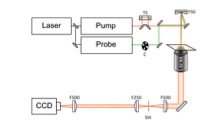Dr Akshay Rao (Optoelectronics Group)
Nanostructured electronic materials such as organic semiconductors, organic-inorganic metal halide perovskites and 2D layered semiconductors have attracted considerable attention both from the point of view of fundamental electronic properties and for applications in next-generation photovoltaics (PVs), light emitting diodes (LEDs) and other optoelectronic devices. In contrast to conventional semiconductors, such as silicon, one of the defining features of these materials is the spatial inhomogeneity of thin films on µm and sub-µm length scales. This has been widely studied by electron microscopy and X-ray techniques, yet an understanding how these structural and chemical properties control and influence exciton and charge dynamics remains unknown.
This lack of understanding can be largely traced back to the fact that transient electronic spectroscopies are traditionally and predominantly performed at the ensemble level, due to the necessity of combining the response from a significant amount of material to generate a measurable signal in the presence of measurement noise, and the use of diffraction limited optical methods. Given the growing importance of these nanostructured materials, there is a clear and growing need for moving ultrafast electronic spectroscopy beyond the ensemble average and towards high spatial resolution. In this project we aim to develop and apply a novel ultrafast pump-probe imaging technique which will combined sub-10fs time-resolution with super-resolution (below diffraction limit) imaging capabilities. We will then apply this instrument to directly visualising energy (exciton) and charge flow in real time in organic, organic-inorganic metal halide perovskites and 2D-layered semiconductors, in collaboration with several national and international partners.


